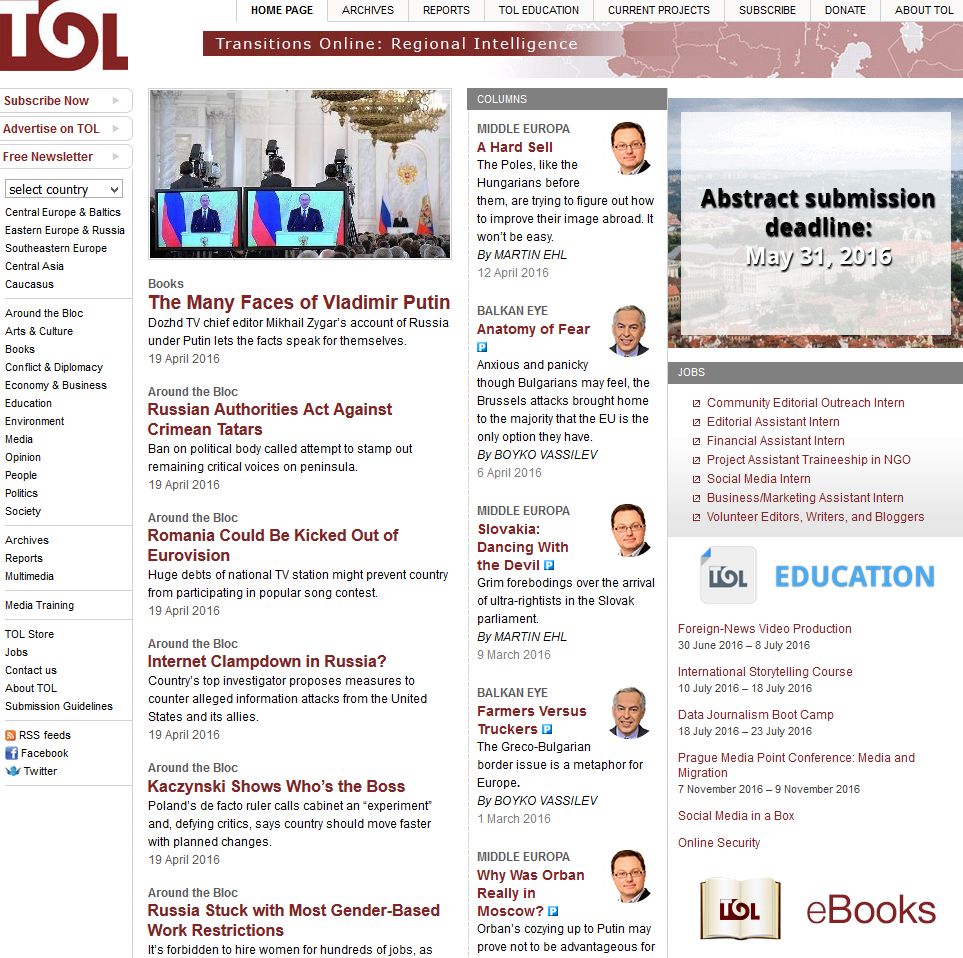
Around the Bloc: Albania’s Leader Calls Donald Trump ‘the Shame of Our Civilization’
Edi Rama says his country is a model of religious tolerance and social cohesion.
More...We kindly inform you that, as long as the subject affiliation of our 300.000+ articles is in progress, you might get unsufficient or no results on your third level or second level search. In this case, please broaden your search criteria.

Edi Rama says his country is a model of religious tolerance and social cohesion.
More...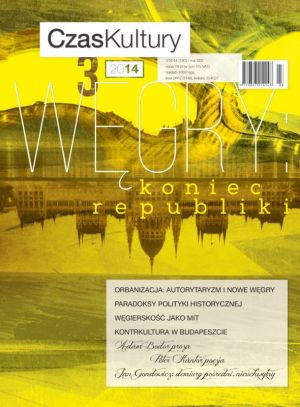
In April 2014, Fidesz, Viktor Orbán’s conservative party, won the parliamentary elections again in Hungary. In June, the government took further steps to silence Hungarian civil society. The authorities introduced further regulations which impose restrictions on the media and social activists, and threaten the freedom of speech. Recently targeted were non-governmental organizations involved in human rights work.
More...
Kyiv says Russians participated in conflict in eastern Ukraine, as swap for jailed Ukrainian pilot might be moving closer to reality.
More...
The following article focuses on the terminology used to label far right political actors. It presents a summary of the academic debate which is still ongoing among the scholars focusing on the far right politics. The article is divided into three parts. In the first part, it introduces a plethora of terms used in this context, and divides them into three larger subgroups. In the second part, it characterizes the contemporary far right on the basis of four different criteria: spatial, ideological, attitudinal and historical. The third, final part, offers a conceptualization of the most common terms, based especially on the writings of the Dutch political scientist Cas Mudde. The primary aim of this paper is to provide the first complex academic treatise of far right terminology, which the Slovak political science still lacks up to this date.
More...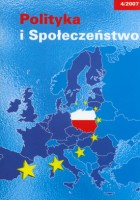
Artykuł analizuje kondycję i dynamikę rozwojową społeczeństwa obywatelskiego w Chorwacji na tle innych krajów Europy i świata. W świetle prezentowanych danych obecną kondycję społeczeństwa obywatelskiego w Chorwacji trzeba określić jako niezadowalającą ze względu na niski odsetek obywateli, którzy są członkami organizacji lub biorą udział w działaniach obywatelskich, a także ze względu na nikły wpływ organizacji obywatelskich na działania w sferze publicznej państwa. Relacje między sferą społeczeństwa obywatelskiego a sferą władz publicznych oraz sferą biznesu należy określić jako w znacznej mierze antagonistyczne i/lub klientelistyczne. Wprowadzane pod presją standardów europejskich i światowych rozwiązania instytucjonalne mają w dużym stopniu fasadowy charakter, choć prawne i podatkowe reguły funkcjonowania organizacji społecznych można określić jako korzystne dla inicjatyw obywatelskich. Wiele organizacji społeczeństwa obywatelskiego cechuje jednak brak przejrzystości i koniunkturalność; przypisuje się im także bezkrytyczne podporządkowanie się wymogom zachodnich sponsorów. Nagłaśniane przez media skandale korupcyjne, w które zamieszani bywają działacze, dodatkowo wpływają na niski poziom zaufania społecznego do organizacji pozarządowych w Chorwacji. Organizacje te nie są też poważnie zainteresowane poszerzaniem bazy członkowskiej. Obecne wzory postaw, samoorganizacji i działań w sferze społeczeństwa obywatelskiego w Chorwacji są w znacznej mierze wynikiem negatywnych historycznych doświadczeń ostatnich stuleci. W okresie gdy Chorwacja stanowiła część monarchii austro-węgierskiej, aktywność obywateli była ograniczana do sfery dobroczynności, sportu i kultury. Po drugiej wojnie światowej komunistyczne państwo zawłaszczyło sferę publiczną w całości i poddało kontroli wszelkie formy aktywności obywateli. Zmiana systemowa po rozpadzie Federacyjnej Republiki Jugosławii doprowadziła do dalszej marginalizacji społeczeństwa obywatelskiego. Wprowadzone wówczas rządy autorytarne w znacznej mierze ograniczały wolności obywatelskie. Wojna, w którą zostało uwikłane społeczeństwo chorwackie na początku lat dziewięćdziesiątych, wprowadziła zamęt w wymiarze postaw i wartości. Badania wskazują, że choć w ostatnich latach poprawiają się zarówno instytucjonalne warunki funkcjonowania sektora pozarządowego w Chorwacji, jak i wzrasta jego potencjał organizacyjny, kraj ten nadal zajmuje odległe miejsce w międzynarodowych rankingach oceniających poziom rozwoju społeczeństwa obywatelskiego.
More...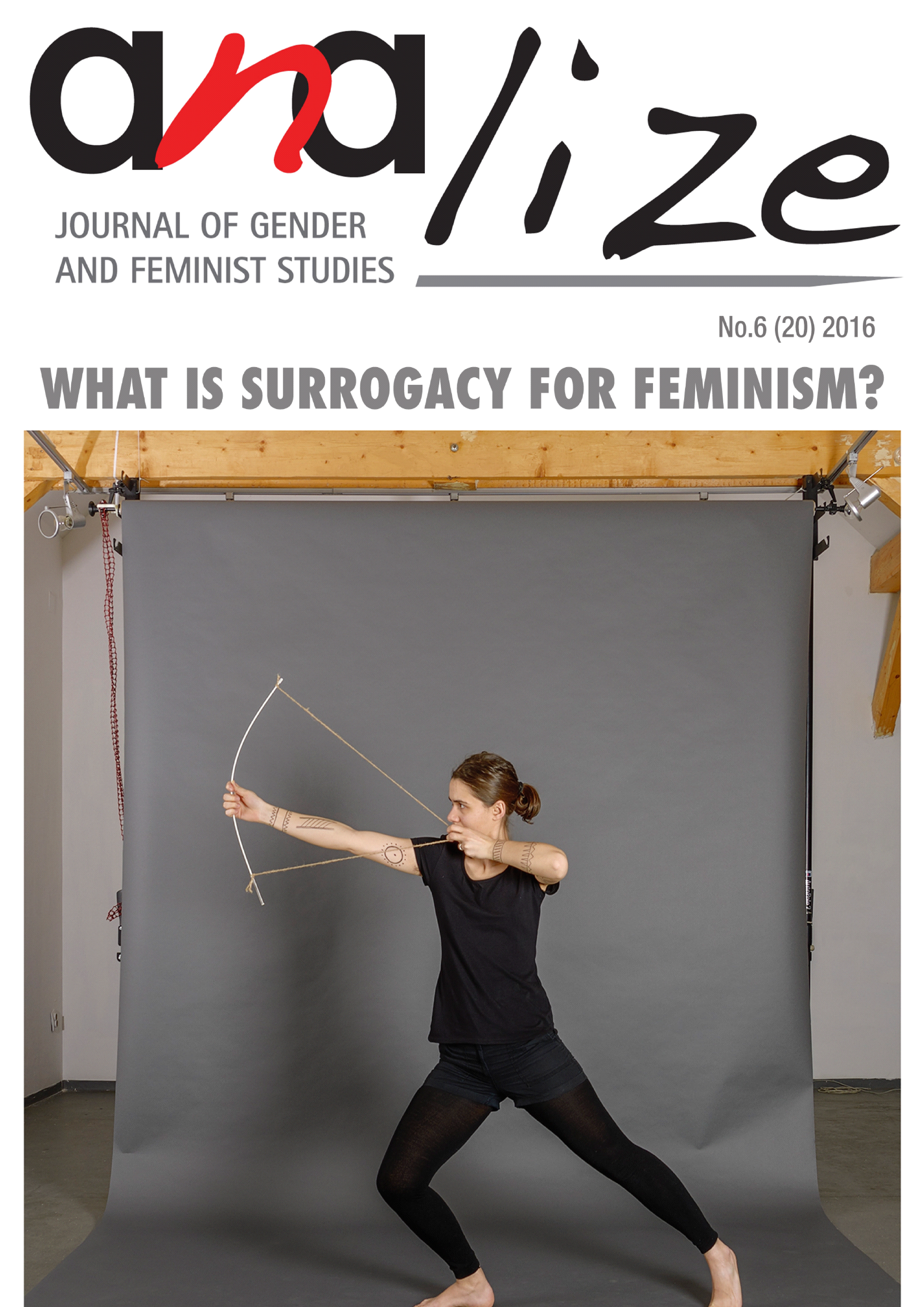

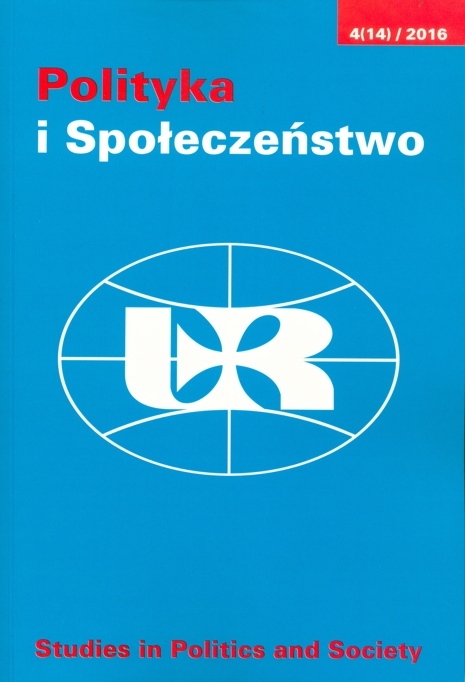
The text presents the civil engagement of the inhabitants of Krakow, as a place that should promote a relatively high level of engagement, against the background of the low level of civil engagement across the entire country. As a result of the analysis of some of the signs of this engagement related to the system of representation, engagement of a participative character, and engagement defined as spontaneous, it has been established however, that while there are a great deal of initiatives, the number of inhabitants participating in them does not justify the conclusion that the engagement is higher than that observed across the country. The reasons for such a state of affairs include, inter alia, the politicization of the local matters, the manner of approach on the part of the local authorities and self-government administration, but above all, a lack of interest on the part of the inhabitants, resulting from the weakness of the social capital and the existing institutional opportunities for fulfilling relevant needs. The predominant motivation with regard to taking up the engagement is a threat to one’s own interest and the predominant form is by signing petitions and appeals
More...
The aim of the analysis is to assess the effectiveness of Polish policy towards the Roma as a public policy. The research method used is a systemic analysis, supplemented by legal and comparative analysis of the sources. The conclusion from the study is that the ethnic public policy against the Roma can be effective. However, this requires the adoption of specific assumptions. The efficacy of public ethnic policy is not associated with the efficiency. It cannot be well judged from the point of view of cost-effectiveness and the measurability of the effects in relation to investment. In addition, the evaluation needs to take into account the category of equity and recognition of European democratic and humanistic values. Such an approach is not common in European society, and discrimination against minorities is becoming more common and intense in Poland and throughout Europe. This is a key issue that may reduce the possibility of implementing public ethnic policy.
More...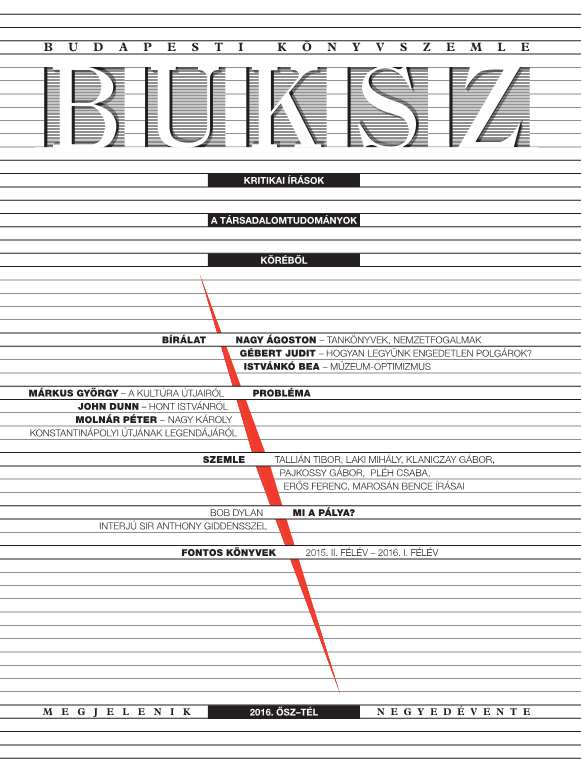
Misetics Bálint (szerk.): Polgári engedetlenség és erőszakmentes ellenállás. Napvilág Kiadó – Humán Platform Egyesület, Budapest, 2016. 287 oldal, 2900 Ft
More...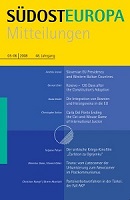
Emigration is one of the most striking topics, both in Romania's recent past as well as itscurrent state of affairs. The more they stay abroad, the more Romanians tend to integrate intheir host societies, building networks and becoming – more or less surprisingly – a factor inRomania's political affairs. In public discourse the term “diaspora” is most commonly used forthis politically active group of emigrants. For a couple of years the number of Romanian citizens in Berlin has continued to grow – just asthe plurality and visibility of this group within roughly 25,000 Romanians living in Berlin. Whenin February 2017 huge protests took place in Romania, the diaspora also took to the streets toexpress its solidarity and influence Romanian politics transnationally. The article argues that theRomanian diaspora in Berlin can be seen as a political subject constituting a kind of third powerbetween home and the new host society. Using results of a survey conducted in autumn 2015 among 125 Romanians in Berlin, thecontribution illustrates how diasporans think about the future of “their” country and how theykeep in touch with Romania. Many of them complain about corruption. A view towardsRomania’s politics vis-à-vis the diasporans underlines future challenges. The article concludesthat the phenomenon of Romanian migration and diaspora can teach us about Europeanizationand the dissolution of the meaning of nation states.
More...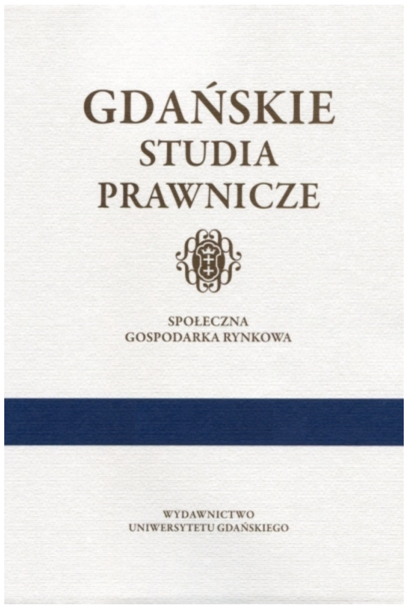
One of the basic ideas and principles of the Polish Constitution of 1997 is the principle of civil society. This principle is also reflected in ordinary legislation. One of its manifestations is the right of citizens to set up non-governmental organizations. Non-governmental organizations represent the interests of citizens and cooperate with the administration of a state in the implementation of public tasks. Particularly, such is the nature of charitable organizations. The activity of non-governmental organizations is an important guarantee instrument of the above mentioned constitutional principle of civil society.
More...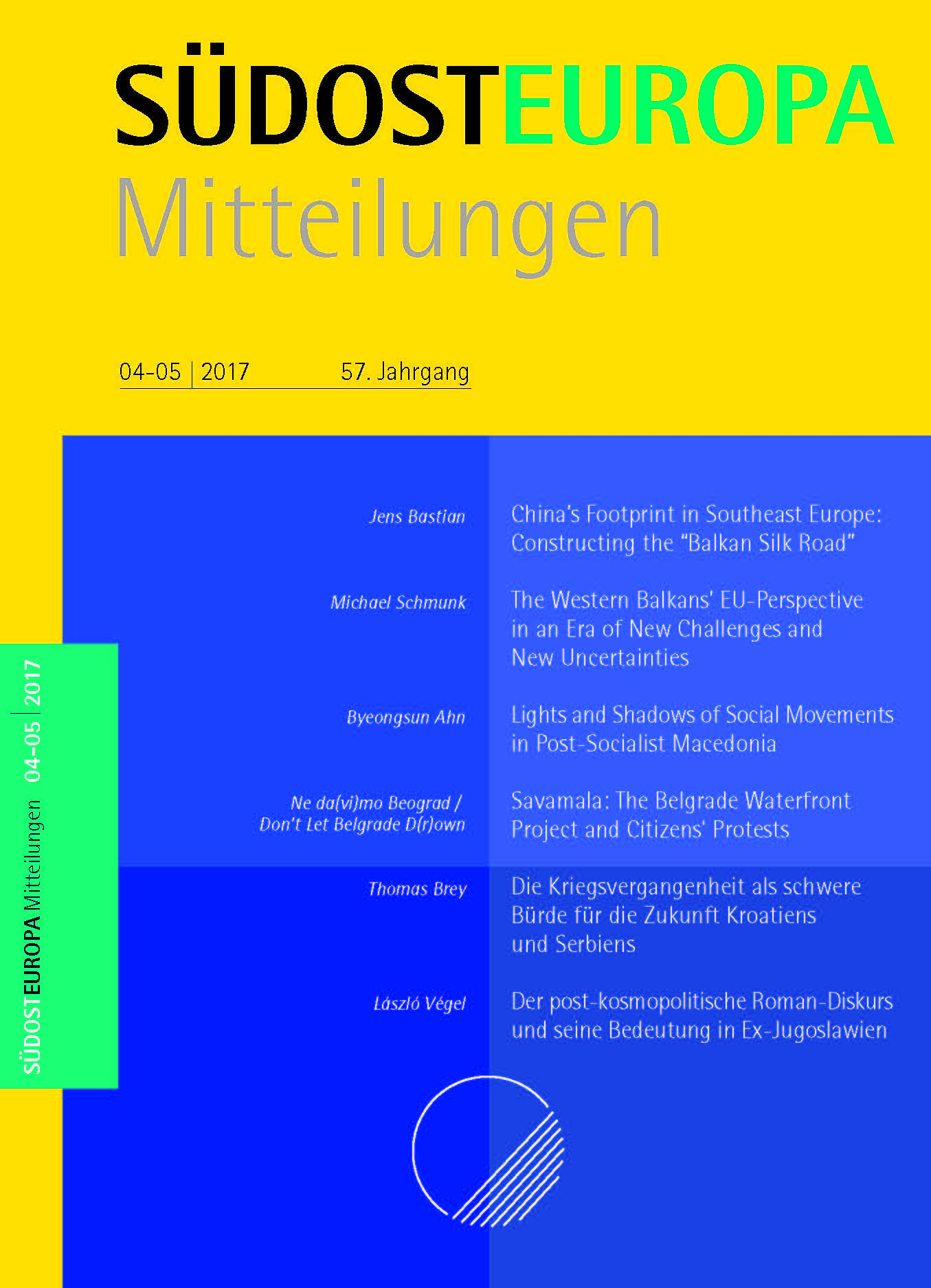
The post-cosmopolitan discourse of European literature accentuates the spirit of open identity, discovering ‘the Other’, initiating a dialogue with him and perceiving one’s own as well as the other’s values, traumas and foreignness. In that respect the modern Serbian resp. Croatian prose remains in accordance with today’s European tendencies – i.e. the complex Yugoslavian identity and its charged conception render modern Serbian and Croatian prose European. Not denying nationality, but presenting it in a regional context, it opens up spaces in world literature. However, the political doctrine of closed national identities looms large. Although we actually had left this stage behind some decades ago, the question remains whether we are returning to the same old times again today.
More...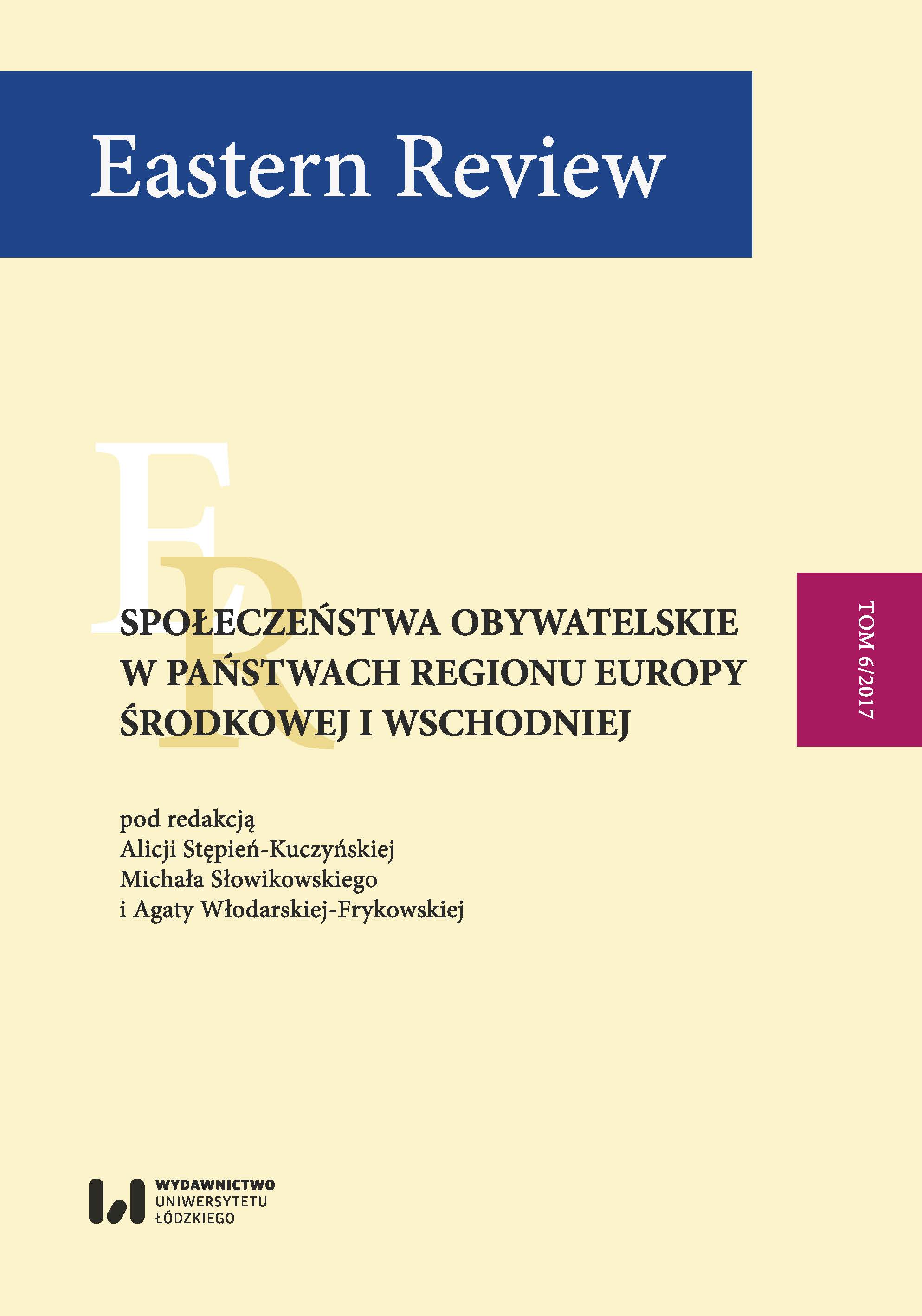
The political science convention of using “participation” to describe only active involvement in deciding public matters and exerting influence by citizens, employees or residents is too narrow. An adequate understanding of “participation” should be based on objective belonging to the social community. Passivity can also be a peculiar form of participation. The sense of participation has many faces. This can be – paradoxically – the feeling of exclusion, of non-participation or alienation, or, on the contrary, the identification, satisfaction, motivation for activity, shared responsibility. Finally, an individual’s sense of participation may combine both of these components. // Политологическая конвенция, основанная на том, чтобы называть участием только активное включение граждан, работников, жителей в решение общественных вопросов и оказания на них влияния – слишком узкое понимание. Адекватное понимание участия относится также к объективной принадлежности и социальной связи. Пассивность также является участием, хотя и особенной формы. Чувство участия имеет разнообразное значение. Это моет быть парадоксальным – чувство исключения, неучастия либо чувство отчужденности, или же наоборот – чувство идентификации, удовлетворения, мотивации к активности, чувство общей ответственности, возможно также чувство амбивалентности.
More...
Artykuł stanowi przyczynek do dyskusji na temat Europy z wykorzystaniem takich pojęć jak różnorodność i wielość. Odwołuje się do teorii Shmuela N. Eisenstadta wielości nowoczesności. Celem artykułu jest teoretyczne i historyczne uzasadnienie stosowania tych pojęć w odniesieniu do definiowania Europy. Ma on zarazem charakter wielowątkowy, jego szeroki zakres problemowy jest uzasadniony m.in. względami filozoficznymi i politologicznymi: zbiorowej tożsamości Europy, jej systemu politycznego i potencjalnych kierunków jej modernizacji. Autorka przyjmuje, iż Europa jako Unia Europejska jest wciąż konstrukcją w procesie i tylko w ograniczonym stopniu może być uznana za coś kompletnego. Tym bardziej, że w ciągu ostatnich kilku lat wydarzenia o zasięgu globalnym, jak upadek żelaznej kurtyny w roku 1989, atak na Centrum Handlu Światowego w roku 2001 czy kryzys finansowy z roku 2008, pośrednio wpływają na jej kondycję. Niektóre kryzysy jak chociażby kryzys migracyjny mają na nią wpływ bezpośredni. // Статья вносит свой вклад в дискуссию на тему Европы с использованием таких понятий, как разнообразие и множественность, отсылая к теории множественности современности Шмуеля Н. Эйнштадта. Целью статьи является теоритическое и историческое обоснование использования этих понятий по отношению к дефинированию Европы. Статья обладает многогранным характером, а ее широкий проблемный спектр обусловлен, в том числе, с философской и политологической точки зрения, коллективным самоопределением Европы, ее политической системой и потенциальными направлениями ее модернизации. Автор принимает, то Европа как Европейский союз, все еще, является явлением в процессе и только в ограниченной степени может быть признана чем-то завершенным. Тем более, что в течение нескольких последних лет события глобального масштаба, такие как падение железного занавеса в 1989 году, террористическая атака на Международный торговый центр в 2001 году или мировой финансовый кризис в 2008 году, косвенно влияют на ее состояние. Некоторые кризисные ситуации, как хотя бы миграционный кризис, имеют на нее непосредственное влияние.
More...
The article analyzes the content, features and the role of communication in the development of civil society in Ukraine. Communication is considered as the reality of civilized existence of the Ukrainian community. The emphasis is on the importance of the benefits of formal and informal communication. // Artykuł poświęcony jest analizie treści, specyfice i roli komunikacji w procesie rozwoju społeczeństwa obywatelskiego na Ukrainie. Komunikacja postrzegana jest jako rzeczywistość cywilizowanego funkcjonowania ukraińskiego społeczeństwa. W artykule rozważane są również zalety odwoływania się do form formalnej i nieformalnej komunikacji.
More...
Artykuł podejmuje problem wpływu sieci społecznościowych na przebieg tzw. Rewolucji Godności (Revolution of Dignity) mającej miejsce na Ukrainie w latach 2013–2014. Autor zaznacza w nim, że rozwój instrumentów komunikacji społecznej w wirtualnej sieci wpłynął znacząco na aktywność obywatelską społeczeństwa, m.in. dzięki nieograniczonemu dostępowi do alternatywnych źródeł informacji. Korzyści płynące z wykorzystania Internetu pociągnęły za sobą również szereg niebezpieczeństw, związanych z masowym procesem komunikacji. W szczególności autor podkreśla znaczenie dezinformacji oraz działań propagandowych prowadzonych przez rosyjskie media, których aktywność odegrała istotną rolę w opisywanych wydarzeniach. // В статье поднимаются проблемы влияния социальных сетей на ход так называемой Революции Достоинства (Revolution of Dignity), имевшей место в Украине в 2013–2014 гг. Автор отмечает, что развитие инструментов социальной коммуникации в виртуальной сети значительно повлиял на гражданскую активность населения, среди прочего, благодаря неограниченному доступу к альтернативным источникам информации. Преимущества, вытекающие из использования интернета, принесли за собой также ряд опасностей, связанных с массовым процессом коммуникации. В особенности, автор подчеркивает значение дезинформации, а также пропагандистской деятельности, проводимой российскими СМИ, активность которых, сыграла важную роль в описываемых событиях.
More...
The article considers the issues of decentralization, implemented in Ukraine after 2014, and the reforms of local self-government and territorial authority organization in Ukraine as the first stage of the administrative reform. The goal of this stage is creation of capable territorial communities as the basis for the fully functional local self-government. A capable territorial community is a voluntary association of territorial communities of villages (towns, settlements), which is be able to provide the proper level of services, particularly in the fields of education, culture, health protection, social services, housing and communal services, independently or through appropriate local government, in view of human resources, financial provision and development of the infrastructure of the respective administrative-territorial unit. The author considers the intermediate results of the process of association of territorial communities and observes the improvement of financial and resource opportunities in the connected communities. At the same time, he focuses on a number of objective and subjective factors affecting the reforms rate. Objective factors include the lack of legislative regulation of new institutions and relations arising in the process of change. Subjective factors are the lack of political will on the part of decision makers, primarily among the members of Parliament, as well as opposition from local political and administrative elites. Another important factor is the disinclination of the communities to unite or a substantial difference of approach to association between state authorities and communities. Identification and analysis of such factors are important for prognostication and preventing delays in the territorial communities association process, as well as for the implementation of the entire reform. // Artykuł poświęcony jest problemom decentralizacji, dokonującej się na Ukrainie po roku 2014. Analizie poddany został pierwszy etap reformy administracyjno-terytorialnej – reforma samorządu lokalnego i terytorialnej organizacji władz. Na tym etapie tworzone są podstawy pod budowę funkcjonowania pełnoprawnego samorządu lokalnego – sprawnej wspólnoty lokalnej. Pod pojęciem tym rozumie się wspólnoty terytorialne siół (osiedli i miast), które w rezultacie dobrowolnego łączenia się są zdolne samodzielnie lub za pośrednictwem odpowiednich organów jednostek samorządu lokalnego zapewnić członkom wspólnoty odpowiedni poziom usług w zakresie: edukacji, kultury, ochrony zdrowia, pomocy społecznej, gospodarki komunalnej, z uwzględnieniem zasobów kadrowych, finansów, rozwoju infrastruktury w jednostkach administracyjno-terytorialnych. Autor rozwa¬ża dotychczasowe osiągnięcia w zakresie łączenia wspólnot terytorialnych i odnotowuje wzmocnienie potencjału finansowego i zasobów w połączonych wspólnotach. Jednocześnie autor zwraca uwagę na szereg obiektywnych i subiektywnych czynników wpływających na tempo reformy. Do czynników obiektywnych zalicza niedoskonałość uregulowań prawnych funkcjonowania nowych instytucji i stosunków, pojawiających się w procesie zmian. Czynniki subiektywne to przede wszystkim brak woli politycznej po stronie decydentów państwowych, w pierwszej kolejności deputowanych Rady Najwyższej, ale także sprzeciw ze strony elit lokalnych politycznych i administracyjnych. Negatywny wpływ na proces łączenia wspólnot ma stosunek samych wspólnot do proponowanych zmian, a także sprzeczność poglądów w tej sprawie pomiędzy wspólnotami a organami władzy państwowej.
More...
The problem of formation of state institutions in the post-Soviet states is one of the most pressing issues in modern political science study of the region of Eastern Europe. However, very often the problems related to the reform of such an important part of state institutions as the administrative-territorial division and the system of local authorities is guided by populist policies, without taking into account objective economic and social realities of certain regions. In this case, the most important issues related to the functioning of the whole system of the state are considered by the leading political forces exclusively in terms of electoral appeal or the professed political doctrine. The article presents a comparative analysis of the relation of the basic approaches to institutional reforms in the Republic of Moldova to political ideology of the main Moldovan political forces represented in the Parliament at different stages of its development. Typically for post-Soviet republics, in the conditions of high fragmentation of political space and low level of culture of political compromise and consensus, the most important institutional reforms are often carried out for the sake of short-term interests of certain political parties and movements. Thus, a change in the political landscape and the balance of power in the Moldovan Parliament, inevitably leads to a change in the program of institutional reforms. In fact, the policies and reform ideology at different stages may be contrary to the whole previous experience and achievements, which leads to the actual resetting of the entire institutional design of the most important Moldovan state institutions. // Zagadnienie budowy instytucji państwowych w regionie poradzieckim pozostaje jednym z najbardziej aktualnych problemów w literaturze dotyczącej przemian politycznych w regionie Europy Wschodniej. Autor konstatuje, iż zagadnienia podziału administracyjno-terytorialnego i systemu organizacji samorządu lokalnego są przedmiotem działań populistycznych, w tym braku nieuwzględniania społeczno-gospodarczych realiów regionów. W wielu przypadkach kluczowe zagadnienia dotyczące funkcjonowania systemu politycznego państw są postrzegane przez głównych aktorów politycznych w kategoriach przedmiotu przedwyborczej rozgrywki politycznej lub też pozostają zakładnikiem ich postaw ideologicznych. W artykule rozważany jest problem reform instytucjonalnych w Republice Mołdawii z uwzględnieniem istniejących teorii politologicznych w tym obszarze, a także preferencji programowo-ideologicznych głównych sił politycznych w Mołdawii. W analizowanym przypadku reformom instytucjonalnym towarzyszą uwarunkowania charakterystyczne zarówno dla regionu poradzieckiego, jak i endemiczne dla Mołdawii, tj. wysoki poziom fragmentaryzacji przestrzeni politycznej i niski poziom kultury politycznej, w tym skłonności do kompromisu i działań konsensualnych. Realizowane reformy podporządkowane są doraźnym interesom głównych grup politycznych, a zmiana układu sił w mołdawskim parlamencie skutkuje radykalną zmianą kierunku reform instytucjonalnych – w niektórych przypadkach anulowaniem dotychczasowych osiągnięć.
More...
Artykuł stanowi analizę procesów migracyjnych zachodzących współcześnie w państwach bałtyckich. Estonia, Litwa i Łotwa to kraje, które muszą zmagać się z dużymi problemami demograficznymi, ponadto wysoki poziom emigracji pogłębia niekorzystne trendy. Po wstąpieniu do Unii Europejskiej w 2004 r. możliwości znalezienia lepiej płatnej pracy oraz kontynuacji wykształcenia na uczelniach europejskich zdecydowanie się rozszerzyły. Szczególnie młodzi Bałtowie korzystają z nowych szans i możliwości, co pogłębia proces starzenia się społeczności. Proces imigracji nie jest zbyt intensywny, dotyczy to głównie ludności pochodzenia rosyjskiego, ukraińskiego czy białoruskiego, która decyduje się tutaj na osiedlenie. Zdecydowanie częściej państwa bałtyckie traktowane są jako kraje tranzytowe do krajów Europy Zachodniej. // Статья представляет собой анализ миграционных процессов, происходящих в настоящее время в балтийских странах. Эстония, Литва и Латвия – страны, которым необходимо справляться с большими демографическими проблемами, а углубляет эти негативные тенденции высокий уровень эмиграции. После вступления в Евросоюз в 2004 году, значительно расширились возможности лучше оплачиваемой работы и продолжения образования в европейских университетах. Пользуются этими возможностями в основном молодые балтийцы, что углубляет процесс старения населения. Процесс иммиграции не интенсивен и касается в основном лиц русского, украинского и белорусского происхождения, которые решаются на постоянное жительство на территории этих стран. Определенно, балтийские страны рассматриваются в основном как транзитные направления в Западную Европу.
More...